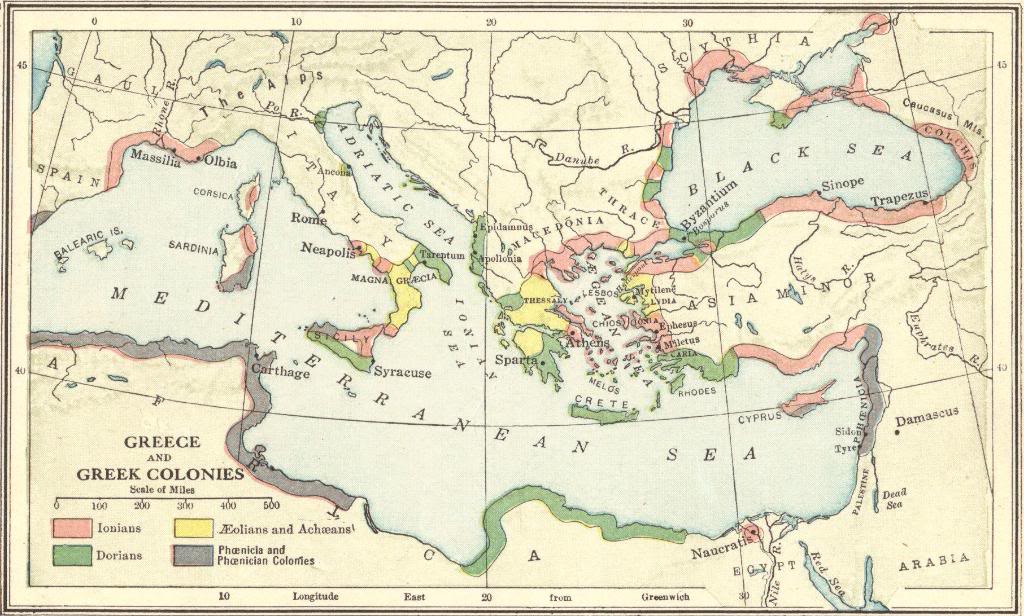| Map of Ancient Greece and the Ancient Greek Colonies |
|---|
| www.studenthandouts.com ↣ World History ↣ Ancient Greece ↣ Images of Ancient Greece |
 |
| Map of ancient Greece and the Greek colonies. Ionians, Dorians, Aeolians and Achaeans, Phoenicia and Phoenician colonies. Greece's colonies stretched across the Mediterranean Sea. Click here to enlarge.
The ancient Greeks spread across the Mediterranean and formed settlements through a combination of factors, including colonization, trade, and cultural influence. Here is an overview of how the Greeks expanded their influence and established settlements in various parts of the Mediterranean. Colonization: The Greeks' desire for colonization in order to facilitate and expand trade was a significant factor in their spread across the Mediterranean. Over several centuries, Greek city-states, particularly those from the regions of Ionia and mainland Greece, established colonies in various directions. These colonies, known as apoikiai, were established for a variety of reasons, including overpopulation, the quest for new agricultural land, and economic opportunities. Trade and Commerce: Greek seafaring and maritime skills were instrumental in their expansion. Greeks were accomplished sailors, and they used their ships to engage in trade with other Mediterranean cultures. This trade network extended their influence and led to the establishment of commercial outposts and settlements. Cultural Influence: Greek culture, including language, art, philosophy, and architecture, was highly influential and attractive to neighboring regions. As Greeks engaged with other societies, they introduced their culture, which led to the adoption of Greek customs and practices. Strategic Location: The Greek mainland and islands were strategically located in the eastern Mediterranean, making them natural hubs for interaction with other Mediterranean civilizations. This proximity facilitated cultural exchange, trade, and the establishment of settlements. Independent City-States: The Greek world was divided into numerous independent city-states, each with its own government and interests. Some city-states, such as Athens, sent settlers to establish colonies, while others, like Corinth, founded colonies for economic and strategic reasons. Consulting Oracles: Ancient Greeks often consulted oracles, such as the Oracle of Delphi, for guidance on important decisions. These oracles might advise city-states to send out colonists to establish new settlements, potentially in response to overpopulation, political unrest, or divine guidance. Political Factors: Conflicts and rivalries within Greek city-states sometimes led to the establishment of colonies as a means to alleviate internal tensions. Settlers might leave their homeland to found new communities in less crowded or contentious environments. Intercultural Contact: As Greeks interacted with various Mediterranean cultures, they absorbed elements from these societies and incorporated them into their own culture. This exchange of ideas and practices contributed to cultural diversity in the Mediterranean. Notable Greek colonies were established in regions such as Southern Italy (Magna Graecia), Sicily, the Black Sea, the coast of Asia Minor, and North Africa. These colonies played a significant role in the dissemination of Greek culture, language, and institutions, and many of them became thriving city-states in their own right. The process of Greek expansion and settlement in the Mediterranean was not uniform and was influenced by a variety of factors in each location. It is a testament to the dynamism and versatility of Greek society during the ancient world. |
 |
 |
 |
 |
 |
 |
|---|
| Ancient Greece Books and Films | Ancient Greece Outlines and PowerPoints |
| Ancient Greece Maps and Pictures | Ancient Greece Study Games |
| Ancient Greece Miscellany | Ancient Greece Worksheets |
| www.studenthandouts.com ↣ World History ↣ Ancient Greece ↣ Images of Ancient Greece |








